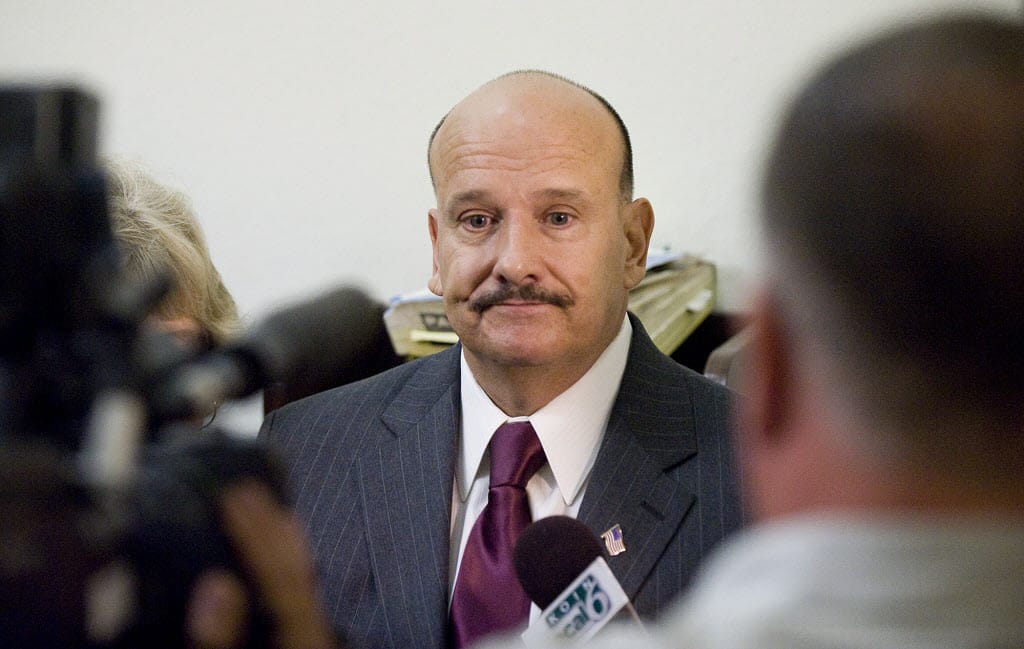A U.S. District Court judge has vacated a $9 million jury award in the case of former Vancouver police officer Clyde Ray Spencer, who spent nearly 20 years in prison after being wrongfully convicted of sexual abuse.
Judge Benjamin H. Settle of the U.S. District Court in Tacoma threw out the jury’s decision in a written order Wednesday, effectively quashing the multimillion-dollar settlement and laying the groundwork for an appeal or retrial.
From his home in California, Spencer said he was “extremely puzzled by the judge’s decision to ignore the jury verdict,” adding that his attorney, Kathleen Zellner of Chicago, intends to appeal the decision to the U.S. Court of Appeals for the 9th Circuit.
The order prolongs a case that’s already faced its share of hurdles.
At trial, the jury determined that former Clark County Sheriff’s Office Detective Sharon Krause violated Spencer’s constitutional rights to due process by fabricating police reports.
The jury also found that Clark County sheriff’s Sgt. Mike Davidson, Krause’s supervisor, had an affair with Spencer’s wife and was liable in his supervisory capacity. At the time of his arrest, Spencer was an officer with the Vancouver Police Department.
He was convicted of child molestation in 1985 and given a life sentence, based on Krause’s investigation. The conviction was commuted in 2004 by outgoing Gov. Gary Locke, who cited serious flaws with how the investigation was conducted.
During the civil trial earlier this year, Zellner presented evidence that Krause and Davidson crafted a phony case against Spencer, alleging he sexually assaulted his daughter, son and stepson. Zellner also said they withheld exculpatory evidence, including a videotaped interview with Spencer’s daughter that cast doubt on his guilt.
In his order, Settle wrote there was insufficient evidence presented at trial to show that Krause and Davidson violated Spencer’s constitutional rights, and that jurors were provided with erroneous instructions.
As part of the order, Settle also called for a second trial if Spencer sought an award.
Spencer disputed that the evidence presented at trial was weak.
“There was no question that there was an affair with my wife, that they tampered with evidence,” he said. “There’s no question that they hid this videotape for 25 years.”
Who would pay the $9 million award also had been the source of a months-long dispute, which will only be prolonged by the appeals process.
The Board of Clark County Commissioners voted Feb. 13 to deny indemnifying Krause and Davidson, even though the county mounted their legal defense, leaving the two effectively on the hook to pay the settlement. The county argued that their conduct did not fall within the scope of their employment, so the county shouldn’t be liable for their misdeeds.
In court filings from May, Zellner asked Settle to order the county to pay the $9 million award. She also asked the court to tack on post-judgment interest, accruing at the rate of about $2,700 a day, along with $1.7 million in legal fees. So far, the amount of post-judgment interest has topped $500,000.
Chris Horne, the county’s chief civil deputy prosecuting attorney, said the county had not changed course and was not a party to the case.
He said he had not yet discussed Settle’s order with commissioners, so he had received no steps to take.
Spencer, meanwhile, vowed to take the county to Circuit Court.
“The county won’t have the choice not to appeal it,” he said. “The county will be responsible for the cost of the appeal.”



